Sarah Paulson and Cynthia Nixon found queer joy ‘in a sea of relentless hideousness’ in Ryan Murphy’s new Netflix series, Ratched

Sarah Paulson and Cynthia Nixon in Ratched. (Netflix)
Ratched stars Sarah Paulson, Cynthia Nixon, Sharon Stone and Sophie Okonedo talk queer representation, surviving the patriarchy and working with Ryan Murphy.
For perhaps not the first time in her life, Sarah Paulson hesitated when Ryan Murphy presented her with a script.
“I thought to myself, I don’t know why he wants me to do this,” she laughs. “This seems like an opportunity to humiliate myself.”
The script was for episode one of Ratched, Murphy’s glossy, Hitchcock-inspired origin series for the iconic antagonist of One Flew Over the Cuckoo’s Nest: Nurse Mildred Ratched.
Set in 1947, about a decade-and-a-half before the Oscar-winner, the show follows Mildred as she joins the staff of an absurdly well-appointed psychiatric hospital.
She’s enigmatic, blunt — not quite the stony-faced tyrant (and, as many critics have noted, a symbol for men’s fear of emasculation) cinema fans have come to know and, well, not exactly love — but a complex woman harbouring a deep, swirling vortex of trauma.
Before filming began on Ratched, Paulson was hesitant to revisit Cuckoo’s Nest, which seemed a “daunting” undertaking.
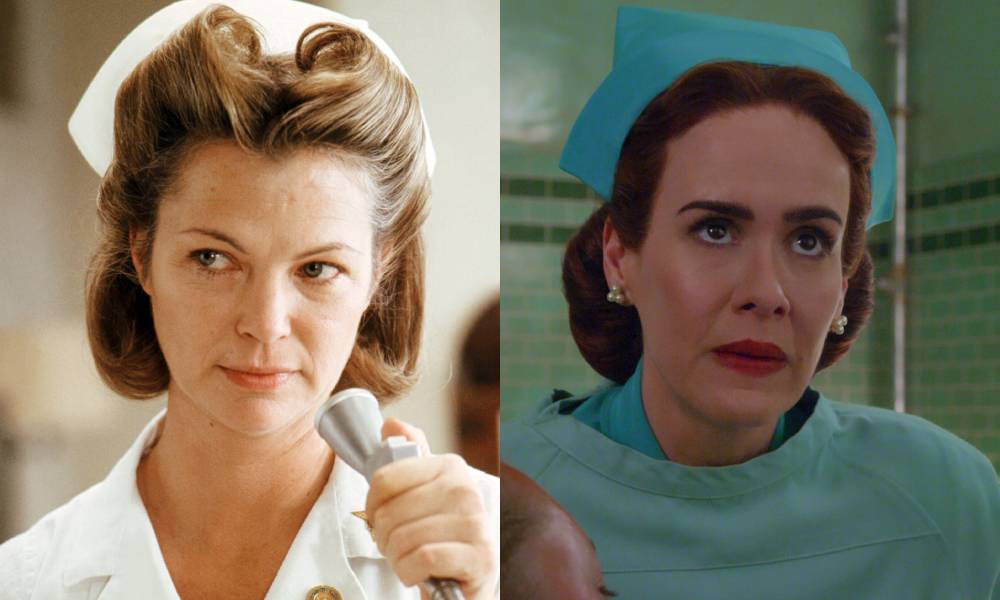
Louise Fletcher (L) played the original Nurse Ratched in One Flew Over the Cuckoo’s Nest. (Getty/Netflix)
“Very rarely as an actor do you get to have a performance that exists that you then reverse engineer,” she says, referring to Louise Fletcher’s Oscar-winning turn as Nurse Ratched.
“But then I thought, it felt disrespectful to me not to [watch it]. It was a perfect performance.”
When she experiences joy, it’s so frightening to her – but not because it’s with another woman.
Paulson’s own interpretation of Mildred isn’t far off. When she first encountered the character in her youth, she could only see her “as a kind of evil heartless person”. But the wisdom of age enabled Paulson to empathise with her.
“When I watched it as I got ready to play her, I thought, oh. She’s a victim of a kind of patriarchal infrastructure that makes it impossible for her to succeed without excising her heart.”
The Mildred Ratched we meet in 1947 is already on that path: forced to present a cold front to survive in a male-dominated world. But she isn’t heartless. In fact, a major thrust of the story is her burgeoning relationship with Gwendolyn Briggs, a political campaign manager fighting to succeed in a toxic environment, played with heartfelt determination by Cynthia Nixon.
“She is far and away the most sane person in Ratched,” Nixon says of the character.
“But more than that, she’s a beam of light. She knows who she is. And she is not only trying to walk in the light for herself, but she is trying to convince Mildred Ratched that there is a world right in front of her that can bring her joy and happiness, and not just the pain.”
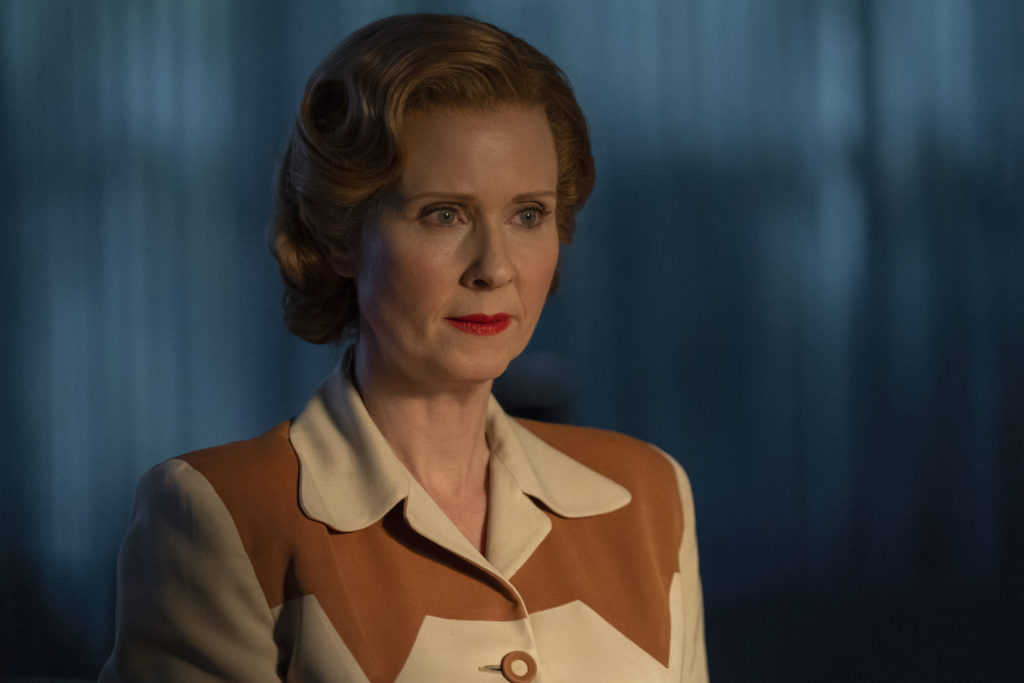
Gwendolyn Briggs is a rare beam of light in Ratched. (Netflix)
Nixon says it was “a real boon” for her and Sarah as queer women to work on the show.
“I think one of the great things that Ryan Murphy does is he sets shows in historical periods where people of colour and queer people are absent from the narrative, and he goes and puts us back in,” she explains.
Murphy executive produced the show from an original script by Evan Romansky, and Nixon is frank about the fact that she and Paulson had to tinker with certain scenes which were clearly written from a male perspective.
“Particularly as we got deeper and deeper into the story,” she explains. “We went in and spent a lot of time talking to the writers and explaining why [certain scenes] wouldn’t be good and [asking] what changes we can make.
“To their credit, they completely, top-to-bottom, rewrote scenes. And I think it was it was very valuable.”
Paulson agrees that “representation is important, in all ways”.
“I think anytime you have a person who actually knows what it’s like to love a woman, playing a person who loves a woman… I think it always lends itself to something being richer and more true,” she says.
“And that’s not to say that a person who doesn’t identify that way can’t play that because they can… but I think the delicacy and the intricacies of anything that involves the heart will only be richer if it’s an experience that one has actually had.”
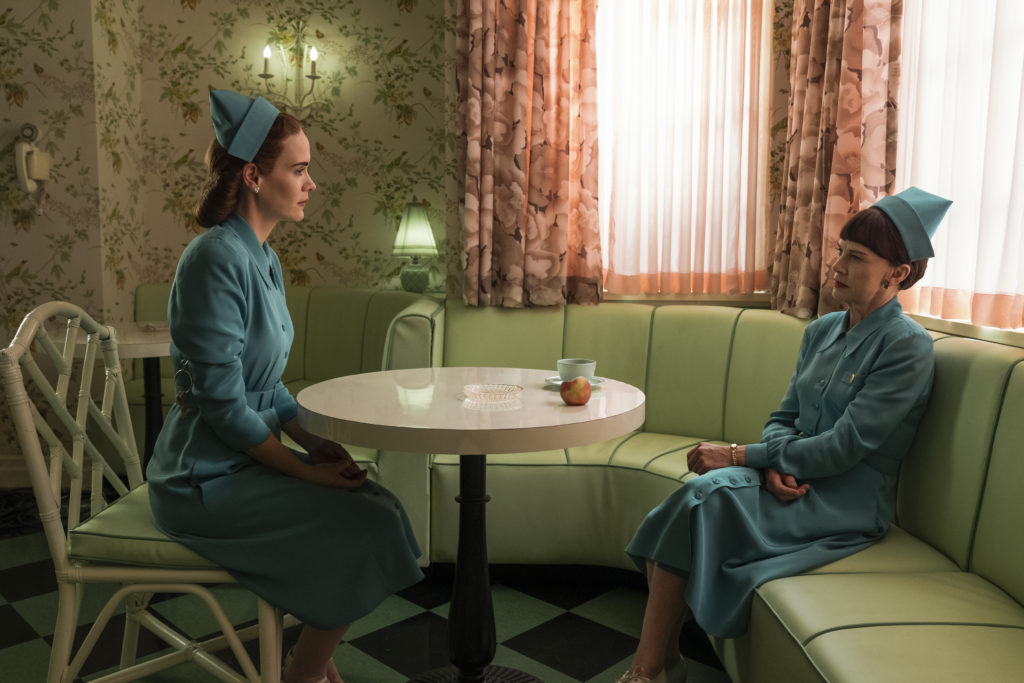
Paulson was thrilled to act opposite one of her heroes, Judy Davis. (Netflix)
Unusually for a period show with queer leads (if such a thing even exists outside of the Ryan Murphy universe), Ratched isn’t a story about coming out, or dealing with homophobic prejudice.
“I think there’s something very beautiful and very powerful about having a character for whom the question of her gayness is not the subject,” Paulson says.
“It is not a story about a woman questioning her sexuality, or even contemplating it that much. I think it’s much more a story about a woman who is so isolated, and has experienced so little joy in her life, that she doesn’t even recognise it when it’s happening.
“And when it does happen, it’s so frightening to her – but not because it’s with another woman. It’s about a person trying to absolve themselves of what she perceives to be a terrible sin, of abandoning the most important person in her life at a very critical moment.”
To explain that final quote would be to (mildly) spoil the plot, but Paulson is right. Ratched is ultimately not a love story between Mildred and Gwendolyn, but an exploration of the former’s deep, all-consuming sense of loss – something the American Horror Story star describes as “a sea of relentless hideousness”.
Brightening that dark ocean is a ridiculously talented cast, even for Ryan Murphy’s standards – an “embarrassment of riches”, as Paulson puts it.
Sharon Stone has a plum part as eccentric aristocrat Lenore Osgood.
Obscenely wealthy and never seen without her pet monkey (“the most communicative animal” Stone has ever worked with), Lenore connects with Mildred over a common enemy.
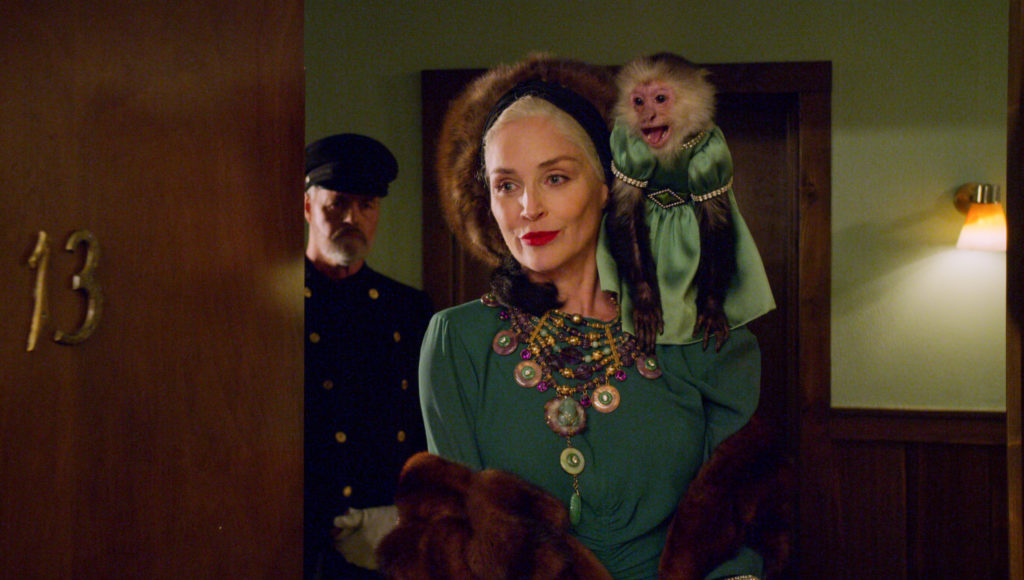
Sharon Stone’s Lenore Osgood. (Netflix)
Despite Stone’s lengthy career, the Oscar-nominated and Emmy-winning actor found working on the show a pleasantly unusual experience, owing to its large female cast.
“For so much of my career in film I worked with just men,” Stone explains. “Women are very different. There’s an intimacy to the work, a fragility that’s different and very engaging. It afforded me, as an actor, an extra opportunity for my character to have other layers of nuance that I wouldn’t have the opportunity to have perhaps with just so many men.”
For Stone, the story illustrates “the weight and the stress of mental illness”.
“A lot of that happens because of institutions of power, and the institutions of power were, of course, completely run by men.
“We have a lot of work [to do], certainly at this point in the world. We are reaching the breaking point of what what has happened because of that. We’re in a point of global crisis because of the madness of what has happened by inappropriate, male-dominated leadership.”
Rounding out the main female cast is Judy Davis – a personal hero of Paulson’s, so much so that her phone case bears the words “Judy F**king Davis” – and British actor Sophie Okonedo, who arguably steals every scene she’s in.
Her character, Charlotte Wells, arrives at the hospital suffering from dissociative identity disorder, with Okonedo jumping from identity to identity to breathtaking effect.
“My favourite was when I got to do all of them very quickly, one after the other,” she explains. “It was like driving a really fast car around a tight corner.”
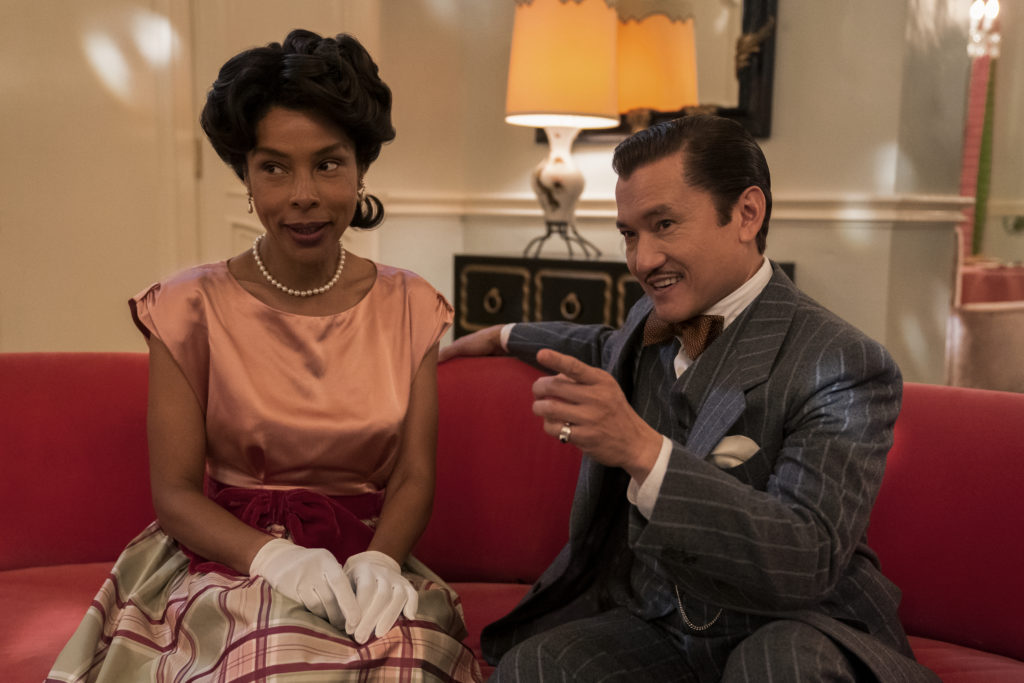
Sophie Okonedo shares a lot of screentime with Jon Jon Briones. the leader of the hospital. (Netflix)
Like her colleagues, Okonedo gushes when talking about the female ensemble.
“I live in Sussex, in the countryside in England in the middle of nowhere, and sometimes I’d think wow, now I’m here, with all these great actors. I’m used to working in so many places and with so many different people… but what was special about this job in particular, was there was a lot of older women, and normally there’s maybe just one of us.”
The eight-part season ends on something of a cliff-hanger – a second run has already been commissioned, with plans for another two to complete Mildred’s story and to reimagine Cuckoo’s Nest.
It would be giving too much away to even discuss whether Stone, Nixon and Okonedo will return – though the characters who survive certainly have some mileage left in them yet – but it’s no spoiler to say that Paulson is on board for the long run.
A decade into her incredible ongoing partnership with Murphy, she knows she’s in comfortable hands – initial apprehension aside.
“He just sells things in a way that it’s impossible to say no,” she says. “And I have often wondered, what would it take?”
“It’s just like, what am I thinking? It does really beg the question, is Sarah Paulson sane?”
Ratched is available on Netflix globally from Friday (September 18).

